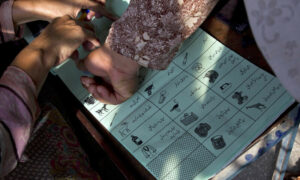DAMASCUS: US diplomats met Syria’s new ruler Ahmed al-Sharaa, head of Hayat Tahrir al-Sham (HTS), on Friday, an official disclosed, as foreign powers seek assurances the country’s Islamist-led authorities will be moderate and inclusive.
The State Department’s top Middle East diplomat Barbara Leaf, presidential envoy for hostage affairs Roger Carstens and senior adviser Daniel Rubinstein, who is tasked with leading the Syria engagement, are the first US diplomats to travel to Damascus since Assad’s rule collapsed.
A US State Department spokesperson said US diplomats discussed the principles of transition in Syria and regional events in a meeting with representatives of HTS in Damascus on Friday.
A Syrian official, speaking on condition of anonymity, disclosed that the US delegation met al-Sharaa, better known as Abu Mohammed al-Golani. “And the results will be positive, God willing,” the official added.
UN team to assess rights situation during next week visit
Their visit follows a statement by Secretary of State Antony Blinken, revealing ‘direct contact’ with HTS.
Washington designated al-Sharaa a terrorist in 2013, saying al Qaeda in Iraq had tasked him with overthrowing Assad’s rule and establishing Islamic sharia law in Syria. The sudden arrival of HTS in the Syrian capital left foreign governments scrambling for new policies.
A State Department spokesperson said before the in-person meeting that the US officials from the Biden administration would discuss with HTS representatives a set of principles such as ‘inclusivity’ and ‘respect for the rights of minorities’ that Washington wants included in Syria’s political transition.
While the ouster of former president Bashar al-Assad ended years of civil war, it has raised concerns over minorities and women’s rights as well as the future of the semi-autonomous Kurdish region.
“They will be engaging directly with the Syrian people, including members of civil society, activists, members of different communities, and other Syrian voices about their vision for the future of their country and how the United States can help support them,” the State Department spokesperson said.
“They also plan to meet representatives of HTS to discuss transition principles endorsed by the United States and regional partners in Aqaba, Jordan.”
While in Damascus, the US diplomats are also working on issues related to the fate of missing US journalist Austin Tice, Majd Kamalmaz and other American citizens who disappeared under Bashar al-Assad’s regime, the spokesperson added.
However, a planned press conference by the US delegation was “cancelled due to security concerns” after a statement was released by the CENTCOM that the US air strikes killed two Islamic State operatives in a part of Syria, formerly controlled by the Assad government and Russia.
The US delegation’s trip follows contacts with France and Britain in recent days, as Western governments are gradually opening channels to HTS and its leader Ahmed al-Sharaa and starting to debate whether to remove the group’s terrorist designation.
Al-Sharaa insists the terrorist designation was unfair, claiming that he opposed the killing of innocent people.
On the other hand, there is widespread apprehension among Syrians that the new administration will gravitate towards hardline religious rule, marginalising minority communities and excluding women from public life.
Obaida Arnout, a spokesperson for the Syrian transitional government, said this week that women’s “biological and physiological nature” rendered them unfit for certain governmental jobs.
Majida Mudarres, a retired civil servant, expressed anger at the comments. “Women have a big role in political life,” the 50-year-old said. “We will be observing any position against women and will not accept it. The time in which we were silent is over.”
Reassess sanctions
Meanwhile, the UN human rights office will send a small team of human rights officers to Syria next week for the first time in years, UN spokesperson Thameen Al-Kheetan told a press briefing in Geneva.
Head of the UN’s migration agency Amy Pope urged “the caretaker government to continue to empower and enable women, because they are going to be absolutely critical to the rebuilding of the country”.
Pope also called for the raft of international sanctions on Syria to be reassessed to help the country regain its footing.
Published in Dawn, December 21st, 2024







